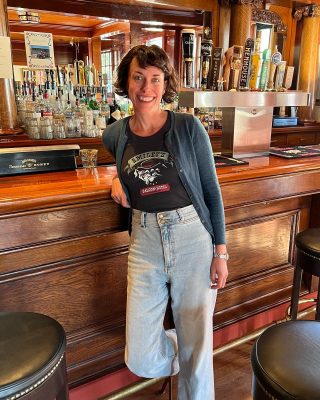The owners of Smiley’s Schooner Saloon, in Bolinas, began developing plans and obtaining permits for a major restoration of the historic building in 2015. They started the actual construction work during COVID, and even secured some of the Federal and State COVID relief loans. The addition of an outside patio allowed Smiley’s to present 120 safe, outdoor music events during the pandemic to help their bottom line, while offering musicians a local venue to perform when indoor spaces were closed.
Music is a passion of Leila Monroe, a co-owner of Smiley’s. She feels strongly that not only providing a stage is critical but supporting and educating emerging musicians is essential. Monroe’s support for emerging musicians is in the forefront at Smiley’s, where she brings her experience from her former role as founder and executive director of Project Amplifi, a now-defunct non-profit that connected good people to good causes through music.
Musicians suffered during the pandemic when music venues were shuttered and stage experiences were in short supply. Like many industries, it was the up-and-comers who suffered the most because they lacked the opportunities to get experiences that build a foundation for a career. Luckily, even though some of Marin’s great establishments like Terrapin Crossroads closed their doors permanently, others like Smileys, Mac’s and Sweetwater took time to reinvent themselves in ways that will support emerging talent even more.
Monroe said, “We believe in supporting musicians who are learning the music business. We also work with independent musicians we’ve been featuring for years, along with touring musicians. There is always a balance. I receive a lot of requests over Instagram, but I still want musicians to go to our website and take a few moments to research us, too.”
Monroe looks at a few things in new talent, such as the professionalism of the response to what is requested on their bookings page, their social media presence, and an understanding of the lead time needed for bookings of 3 to 6 months in advance. She looks at the way the musician is committed to building out a brand.

“For instance, one group only had a couple hundred followers, but everything else about them was very professional. Their kit altogether was professional and that’s what mattered,” said Monroe.
It isn’t just about the music. Monroe suggests emerging musicians stay on top of their game the night of their performance. A venue will pay attention to how an artist or band conducts themselves for the performance. Do they conduct themselves with respect and professionalism? Do they show up on time? Do they communicate well, show up sober and ready to play? Stay sober, and engage with the audience? These things will determine whether Smiley’s books a group again.
Mac’s at 19 Broadway felt the pinch of shifting musical tastes and area demographics before COVID. The demand for rock bands that set up at 10 p.m. diminished. Fortunately for the community, the club and dingy dive bar that was once the hot epicenter of the Fairfax rock scene received a striking makeover to re-emerge as a 20’s style speakeasy cocktail bar, with a VIP room and piano bar. Mac’s re-opened in July of last year toward what everyone hoped would be the tail end of COVID restrictions. Their pandemic policy follows whatever the county mandates. The audiences keep growing, and the talent is varied with booking inquiries coming in every day.
“There are different types of emerging musicians,” said Jon Moore, co-owner of Runaway DJ and talent booker for Mac’s beautiful new space. “There are emerging musicians in Fairfax or other parts of Marin looking for an opportunity to play. Then, there’s the represented talent that have managers and or production companies. I would say we probably get five to one in terms of people who are represented wanting to play here as they’re traveling through. Tony Lindsay, an 11-time Grammy winner, is an example.”
Moore looks for young talent who are from around the Bay Area. Since Mac’s demographics are evolving with the makeover, some talent appeals to an older demographic. Yet, young people make up a good majority of their patrons. Moore wants music that resonates with the younger audiences so he finds groups and/or DJs that will be a good fit for pleasing a mixed demographic crowd, often with specially themed music nights. Many of the bands he is looking at currently fit that younger age bracket.
Moore’s excited about a group called Chill Clinton, and another one called the Stephanie Woodford Quartet. The Quartet features singer Woodford on the piano and Noah Frank on the trumpet, putting their spin on classic jazz, contemporary soul (Alicia Keys-type music), Stevie Wonder, Marvin Gaye, and some Fleetwood Mac.
“It’s really cool how the crowd reacts to it (Stephanie Woodford Quartet) because sometimes they just want to listen, sometimes they wanna jump in there and dance. This group is always very entertaining, and Stephanie still drinks Shirley Temples,” said Moore.
According to Moore, one of the best ways to vet new talent is to see and hear them play music because when you hear it live, you know if they’re special, you experience it. Whether or not he’s heard of them before doesn’t matter. It can be hard to get a band to come in and play as an audition. Typically, he’ll ask them for some type of live video recording rather than a polished, highly produced audio recording. With a video, he can see how they engage with an audience. He can see if they’re inspired by just playing music.
“I’ve had some younger people pull an especially huge ‘no-no’ by suggesting I Google them if I need more information. If they want an opportunity to perform, they need to work for it, too,” Moore said.
Moore has some advice for aspiring musicians. Learn to market yourself and do it well. Know the engines that can communicate your message and make it compelling. Be creative and do something that’s going to catch the imagination, that’s interesting and makes people want to know more.
Another revered venue, the Sweetwater Music Hall in Mill Valley, is a great spot for live music. Chris Porter, Sweetwater’s new talent buyer, came on board in January. He said that the Shuttered Venue Operating grants, part of the federal relief package, were a huge lifesaver for so many venues all over the country that had to come up with creative ways of surviving.
Porter continues Sweetwater’s long history that goes back to the 70s of showcasing new and well-established musicians. It’s a venue where musicians of all levels want to perform. Porter brings his experience from years of talent acquisition with San Francisco’s Hardly Strictly Bluegrass and the Seattle’s Bumbershoot Festival.
Porter and Sweetwater’s general manager and executive director, Maria Hoppe, met at the Bumbershoot Festival where they worked for a number of years. Hoppe oversees Sweetwater Music Hall Arts Fund, a 501(c)(3) formed in late 2020 to promote arts education, especially music. The two sides of the organization come together through the performance space made available for young musicians.
Hoppe is very happy to be working with Porter again because he is so skilled at what he does and understands both the music business and the nonprofit focus. Sweetwater still has a traditional Open Mic evening, hosted by Austin Delone, which often attracts people under the age of 18 who come and perform on that night.
“Austin is great at including them and making them feel really welcome. In addition, this month, we’ve had 6 evenings dedicated to emerging musicians. We also partnered with a number of local organizations who work specifically in youth music education,” said Hoppe.
Sweetwater hosted Bandworks two weeks ago for a whole day with its all-kids’ bands. They’ve featured Crossroads Music Community, which can be a bit of a mix with some adult musicians performing in that program, along with a decent number of kids. On March 23, they’ll be featuring Marin School of the Arts high schoolers doing their Rock Bands Showcase. Recently, Hoppe featured members of Mill Valley’s Wow! Music Studios and began working with Helix School in Mill Valley, which supports kids on the spectrum of autism through music education and future performance opportunities.
Hoppe said, “We want to reach kids in other parts of Marin and the wider Bay Area community, once it is safe to do so and we can ramp up our efforts. Eventually, we’d like to offer internship opportunities, so youth learn the music business along with learning more about performing.”
For the main stage, Chris Porter said his job is to keep an ear to the ground and his eyes open.
“There’s a plethora of music right at my fingertips on my computer. I’ll be reading the press or catching a buzz of what’s happening with a band. There’s a lot of different blogs and, obviously, Spotify and different streaming sites,” said Porter. “I do my homework, but I’ve only got two ears and 24 hours in a day. Talent also finds me. I’m always immersed in music. I work at Hardly Strictly Bluegrass. So, I’m always researching what could be a good opportunity or fit for that festival that will also carry over to some synergy with Sweetwater Music Hall programming. As I said, I find them; they find me.”
New talent is always looking for a way in, and Porter has some suggestions. Be realistic about what you’re capable of, and take your time. Keep working on your music as a craft. Don’t worry about having to play really tiny places.
Porter has seen artists get frustrated in the music business and feel like they’re not getting anywhere. He has seen so many great songwriters and musicians give up, or give up on a particular project that is really good but for some reason it’s just not clicking yet with a wider audience. His advises musicians to keep going. Keep honing your craft and have somebody in the band getting you on social media to spread the word. Don’t rush out to get a manager because you are better off learning about the music business if you want to sustain yourself financially.
“There is something to be said for music business education and experience. Don’t be afraid to embrace that,” said Porter.

Kate Fitzsimmons is a freelance writer and fund development professional. Her writing skills were honed as a Contributing Editor to The San Francisco Review of Books where she interviewed John Updike, Joyce Carol Oates, Bobbie Ann Mason, Alice Walker and others. She works with businesses, nonprofits and entrepreneurs to assist them in raising their visibility through their stories. When she isn’t writing, she is cooking for friends, collecting art or engaged in a good novel.